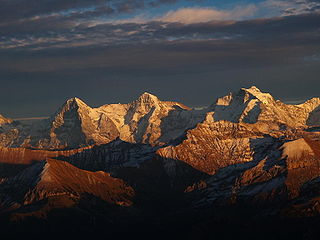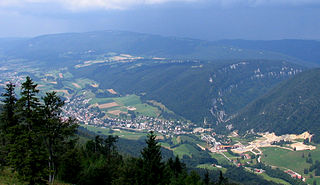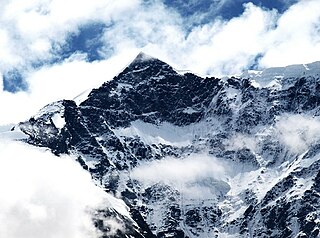
Swiss German is any of the Alemannic dialects spoken in the German-speaking part of Switzerland and in some Alpine communities in Northern Italy bordering Switzerland. Occasionally, the Alemannic dialects spoken in other countries are grouped together with Swiss German as well, especially the dialects of Liechtenstein and Austrian Vorarlberg, which are closely associated to Switzerland's.

The Bernese Alps are a mountain range of the Alps, located in western Switzerland. Although the name suggests that they are located in the Berner Oberland region of the canton of Bern, portions of the Bernese Alps are in the adjacent cantons of Valais, Fribourg and Vaud, the latter being usually named Fribourg Alps and Vaud Alps respectively. The highest mountain in the range, the Finsteraarhorn, is also the highest point in the canton of Bern.

The Bernese Mountain Dog is a large dog breed, one of the four breeds of Sennenhund-type dogs from the Swiss Alps. These dogs have roots in the Roman mastiffs. The name Sennenhund is derived from the German Senne and Hund (hound/dog), as they accompanied the alpine herders and dairymen called Senn. Berner refers to the area of the breed's origin, in the canton of Bern. This breed was originally kept as a general farm dog. Large Sennenhunde in the past were also used as draft animals, pulling carts. The breed was officially established in 1912.

The canton of Bern or Berne is one of the 26 cantons forming the Swiss Confederation. Its capital city, Bern, is also the de facto capital of Switzerland. The bear is the heraldic symbol of the canton, displayed on a red-yellow background.

Grindelwald is a village and municipality in the Interlaken-Oberhasli administrative district in the canton of Berne. In addition to the village of Grindelwald, the municipality also includes the settlements of Alpiglen, Burglauenen, Grund, Itramen, Mühlebach, Schwendi, Tschingelberg and Wargistal.

Romandy is the French-speaking part of western Switzerland. In 2018, about 2.1 million people, or 25.1% of the Swiss population, lived in Romandy. The majority of the romand population lives in the western part of the country, especially the Arc Lémanique region along Lake Geneva, connecting Geneva, Vaud and the Lower Valais.
Bernese German is the dialect of High Alemannic German spoken in the Swiss plateau (Mittelland) part of the canton of Bern and in some neighbouring regions. A form of Bernese German is spoken by the Swiss Amish affiliation of the Old Order Amish in Adams County, Indiana, United States, as well as and other settlements in the US, primarily in Indiana.

The Bernese Oberland is the highest and southernmost part of the canton of Bern, and one of the canton's five administrative regions. It constitutes the Alpine region of the canton and the northern side of the Bernese Alps, including many of its highest peaks, among which the Finsteraarhorn, the highest in both range and canton.
This article is about the phonology of Bernese German. It deals with current phonology and phonetics, including geographical variants. Like other High Alemannic varieties, it has a two-way contrast in plosives and fricatives that is not based on voicing, but on length. The absence of voice in plosives and fricatives is typical for all High German varieties, but many of them have no two-way contrast due to general lenition.

Bernese Jura is the name for the French-speaking area of the Swiss canton of Bern, and from 2010 one of ten administrative divisions of the canton.

Titlis is a mountain of the Uri Alps, located on the border between the cantons of Obwalden and Bern. At 3,238 metres (10,623 ft) above sea level, it is the highest summit of the range north of the Susten Pass, between the Bernese Oberland and Central Switzerland. It is mainly accessed from Engelberg (OW) on the north side and is famous as the site of the world's first rotating cable car. The cable car system connects Engelberg to the summit of Klein Titlis through the three stages of Gerschnialp, Trübsee and Stand.

The Tschingelhorn is a mountain of the Bernese Alps, located on the border between the Swiss cantons of Bern and Valais. The summit of the Klein Tschingelhorn on the west is the tripoint between the valleys of Kandertal, Lauterbrunnental and Lötschental. The main summit lies between the Lauterbrunnental and the Lötschental.

The Bernese March is the traditional anthem of the Swiss Canton of Bern and is played at official occasions.

The Wellhorn is a mountain of the Bernese Alps, overlooking Rosenlaui in the Bernese Oberland. On its eastern side is the Rosenlaui Glacier.

The Klein Grünhorn is a mountain of the Bernese Alps in Switzerland, situated north of the Gross Grünhorn in the canton of Valais.

Kleines Fiescherhorn or the Ochs is a mountain peak of the Bernese Alps, situated on the border between the cantons of Berne and Valais in Switzerland. Together with Grosses and Hinteres Fiescherhorn to the west they build the Fiescherhörner.
The International Bernese Ladies Cup is an annual bonspiel which was started in 1968 and became an event on the women's World Curling Tour in 2007. It is held every January at the Curlingbahn Allmend in Bern, Switzerland.
The Chlyne Lohner is a mountain of the Bernese Alps, located between the valleys of Adelboden and Kandersteg.

The Klein Lauteraarhorn is a peak of the Bernese Alps, overlooking the Unteraar Glacier in the canton of Bern. It lies south of the Lauteraarhorn, on the range separating the Strahlegg Glacier from the Lauteraar Glacier, both tributaries of the Unteraar Glacier.

The Hugihorn is a peak of the Bernese Alps, overlooking the Unteraar Glacier in the canton of Bern. It lies south of the Klein Lauteraarhorn, on the range separating the Strahlegg Glacier from the Lauteraar Glacier, both tributaries of the Unteraar Glacier.
















